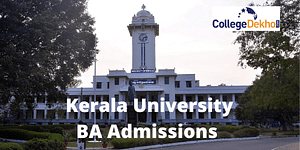MA Public Policy
About M.A. Public Policy
M.A. Public Policy is a 2-year full-time PG level programme that primarily focuses to impart knowledge amongst the students about the skills addressing economic, political, and social issues. It also aims to provide them with some management skills to resolve these issues with coherent solutions. The subjects covered under this course are law and governance, statistical and data analysis, qualitative and quantitative research, social public policy process, academic and economic writing for public policy, political philosophy, social and cultural theory along with some other subjects. In addition, students also get training in writing their dissertations.
It is mandated for students to fulfill the minimum eligibility criteria to get admission to M.A. Public policy. To be eligible, applicants must hold a Bachelor’s degree in relevant discipline from a recognized board/university with at least a minimum aggregate of 50% marks in the last qualifying examination.
Admission to M.A. Public Policy is done either on the basis of merit lists or entrance exams conducted by the admission authorities. The admission fees for M.A. Public Policy courses vary from university to university but the average annual course fees generally range between INR 12,000 and INR 1,80,000.
M.A. Public Policy graduates can work as a Research Associate, Policy Analyst, Government Analyst, Lobbyist, Statistician, Chief Administrative Officer, Program Director, etc. The average salary ranges between INR 3,00,000 – INR 9,00,000 per annum in top recruiting companies like ActionAid, Bennett & Coleman, Indian Revenue Services, Thornton, etc.
Also, after completion of M.A. Public Policy, candidates can pursue higher studies and advanced academic exploration along with research through M.Phil. and Ph.D. courses.
M.A. Public Policy Course Highlights
Course Level |
Post-graduate |
|---|---|
|
Duration of Course |
2 Years |
|
Type of Examination |
Both:
|
|
Minimum Eligibility Criteria |
Bachelor’s Degree in any course from a recognized university with at least minimum aggregate of 50% marks. |
|
Admission Process |
Based on:
|
|
Average Annual Fees |
INR 12,000 to 1,80,000 (Approx.) |
|
Average Annual Salary |
INR 3,00,000 - INR 9,00,000 per annum |
|
Job Roles |
Policy Analyst, Lobbyist, Government Analyst, Research Associate, Statistician, Chief Administrative Officer, Program Director, Assistant Professor, Public Affairs Manager, Director of Public Policy etc. |
Table of Contents
M.A. Public Policy Eligibility Criteria
Applicants must meet the mentioned eligibility criteria to be considered for M.A. Public Policy Admission:
- The applicant must have secured a minimum aggregate score of 50% in the 12th class from any recognized board/institution.
- The applicant must be a graduate with a bachelor’s degree in any course with at least minimum aggregate of 50% marks secured.
- It is mandatory to own a graduation degree from a college or university which is affiliated.
M.A. Public Policy Admission Process
Admissions to the M.A. Public Policy are done based on both Merit and Entrance Examinations.
- Merit List Admission: The applicants’ admission will be on the ground of marks secured in the entrance test held by the university. Applicants must fall under the merit list for the selection process of M.A. Public Policy Admission.
- Direct Admissions are also been done in this course, some universities offering M.A. Public Policy grant admission to students based on the marks secured in the last qualifying examination (graduation level).
- Entrance Exam Admission: All reputed colleges and universities conduct various entrance examinations for the candidates for the admission process in the M.A. Public Policy course within their colleges/universities.
The steps of the entrance-based admission for M.A. Public Policy are listed below:
Step 1 |
Registration |
Applicants have to register themselves using their valid email id and mobile number. |
|---|---|---|
|
Step 2 |
Filling up of Application Form |
After creating the login id, applicants fill in the application form by providing the required information correctly. |
|
Step 3 |
Uploading of Documents |
Applicants have to upload the necessary documents such as photograph, signature, id proof, Class 10 and 12 certificates, Bachelor’s degree etc in the defined dimensions or size of the documents. |
|
Step 4 |
Application Fee |
On uploading the required documents, applicants have to pay the requisite amount of application fee via online mode. |
|
Step 5 |
Issuing of Admit Card |
Based on the details submitted by the applicants, the admission authority will issue the admit cards to the eligible candidates. |
|
Step 6 |
Entrance Examination |
After receiving the admit card, examination dates will be released by different conducting bodies. Applicants have to sit for the entrance test and qualify the same to get admission. |
|
Step 7 |
Declaration of Result |
Admission authorities will declare the results of the entrance test they have appeared for. |
|
Step 8 |
Enrolment |
Qualified applicants will then be allotted seats to the respective colleges/institutes. |
M.A. Public Policy Entrance Exam
There are only a few colleges which conduct an entrance examination for admission to the M.A. Public Policy course. The duration of entrance examination is of 2 to 3 hours during which the students are required to attempt objective type questions.
The entrance examination details are released by the colleges every year respectively. This academic year, all the entrance examination dates have been delayed and the new dates for the same are yet to be released.
M.A. Public Policy Syllabus
The M.A. Public Policy syllabus covers a theoretical and practical comprehensive and integrative curriculum which spread over the four semesters in two years. A semester-wise breakup of the M.A. Public Policy syllabus is tabulated below:
Semester I |
Semester III |
|---|---|
|
Law, Governance and Institution |
Administration & Public Finance |
|
Data Analysis & Statistical |
Programme Design & Evaluation |
|
Research Methodology (Qualitative) |
Pre-Dissertation Writing |
|
Public Policy Process |
Elective |
|
Academic Writing (Workshop) |
- |
|
Public Policy Economics - I |
- |
|
Semester II |
Semester IV |
|
Public Policy Economics - II (Macro) |
Dissertation & Capstone |
|
Political Philosophy |
Electives |
|
Policy Action (Workshop) |
- |
|
Social & Cultural Theory |
- |
|
Electives |
- |
Top M.A. Public Policy Colleges in India
Applicants can check here the list of top M.A. Public Policy Colleges in India along with their admission process, average fee (per annum) and average annual salary before choosing a college for them:
Name of Institution |
Admission Process |
Average Fee (per annum) |
Average Annual Salary |
|---|---|---|---|
|
University of Lucknow, Lucknow |
Based on Entrance |
INR 36,000 |
INR 4,38,000 |
|
Mumbai University, Mumbai |
Based on Entrance |
INR 34,405 |
INR 5,28,000 |
|
Adamas University, Kolkata |
Based on Entrance |
INR 1,05,100 |
INR 6,00,000 |
|
OP Jindal Global University, Sonepat |
Based on Merit |
INR 3,51,000 |
INR 8,78,000 |
|
MSRUAS, Bangalore |
Based on Merit |
INR 2,63,250 |
INR 7,25,000 |
|
Dr. B.R. Ambedkar University of Social Sciences, Indore |
Based on Merit |
INR 12,000 |
INR 5,97,000 |
|
JSGP, Sonepat |
Based on Merit |
INR 2,50,000 |
INR 6,87,000 |
|
Central University of Jammu, Jammu |
Based on Merit |
INR 11,715 |
INR 3,52,000 |
*The figures mentioned above are the estimated values and are subjected to change.
M.A. Public Policy Job Profiles and Salary
After completion of M.A. Public policy, applicants can work in both government and private sector. The top career options for M.A. Public Policy graduates are in the field of research, advocacy, monitoring, social entrepreneurship and etc.
The top recruiting companies for M.A. Public Policy graduates are ActionAid, Bennett & Coleman, Chase India, Asian Development Research Institute, Indian Revenue Services, Grant Thornton, Dell Incorporation, MSME Foundation, Axis Foundation and etc.
Some of the popular jobs roles for M.A. Public Policy graduates along with the corresponding salaries are tabulated below:
Job Profile |
Job Description |
Average Annual Salary |
|---|---|---|
|
Policy Analyst |
The job role of a Policy Analyst is to identify the issues and exploring areas for policy areas, collecting information followed by analyzing that information. In addition, they also have to come up with new policies to address the existing problems of existing policies and government programs. |
INR 5,87,632 |
|
Lobbyist |
The primary job role of a lobbyist is to convince the legislators to opt for certain public policy of their clients interest with the help of statistical analysis or research. |
INR 6,97,218 |
|
Public Affairs Manager |
Public Affairs Manager’s job role is to monitor the effects of any changes in the public policies on the company, charity, trade union, think-tank, or trade association that they work for. |
INR 4,84,604 |
|
Research Associate |
Research Associate are responsible for the market research and gathering that data to help their company with better marketing of their products or services. Also, to identify company’s competitors and analyzing their market details. |
INR 3,02,473 |
|
Chief Administrative Officer |
Chief Administrative Officer, are the top-tier executive manages responsible for supervising all the administrative, financial, and marketing-related business of any company. |
INR 9,21,034 |
*The figures mentioned above are the estimated values and are subjected to vary from person to person and company to company.
Related Questions
Popular Courses
- Courses
- M.A. Public Policy


















